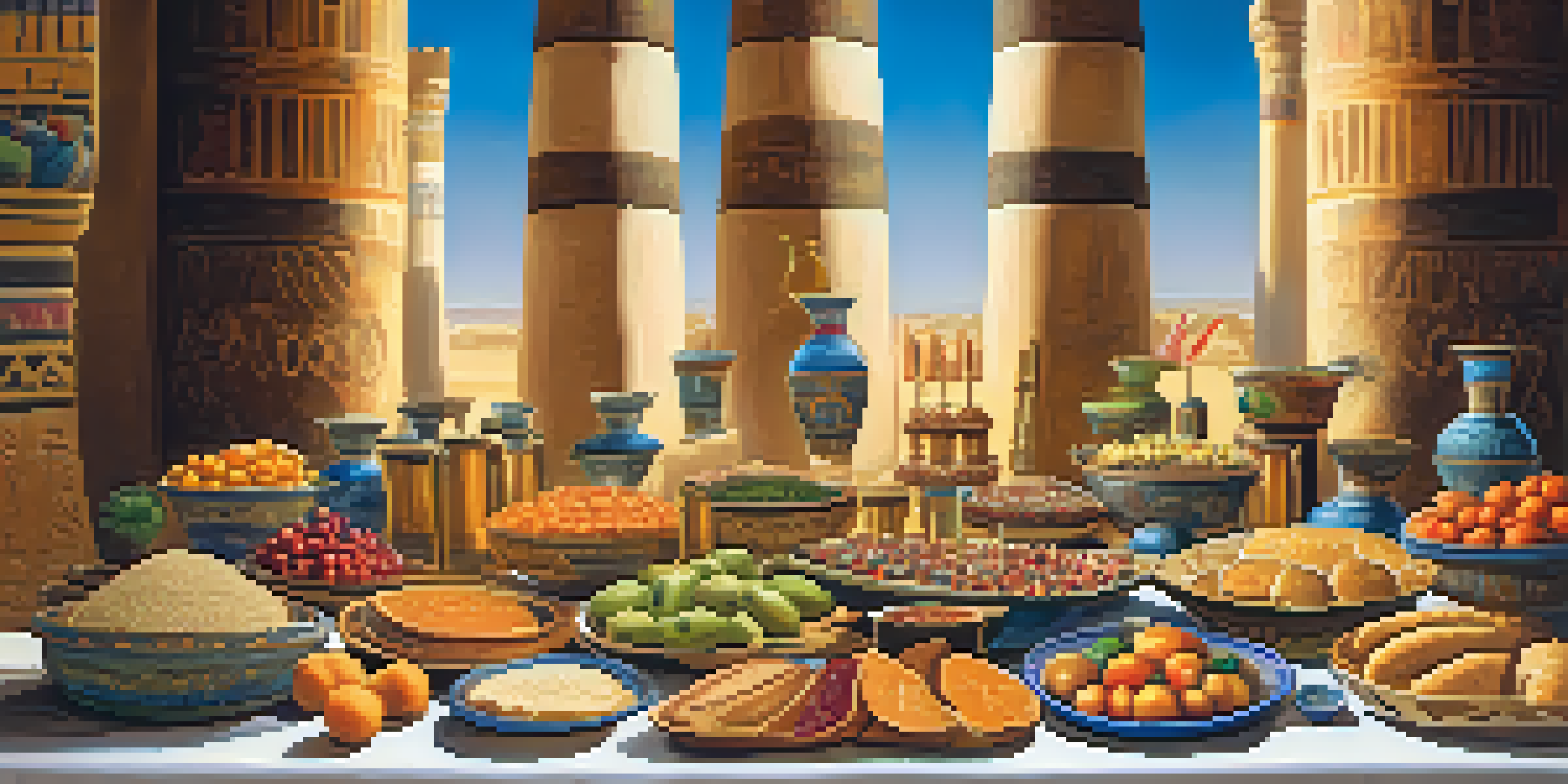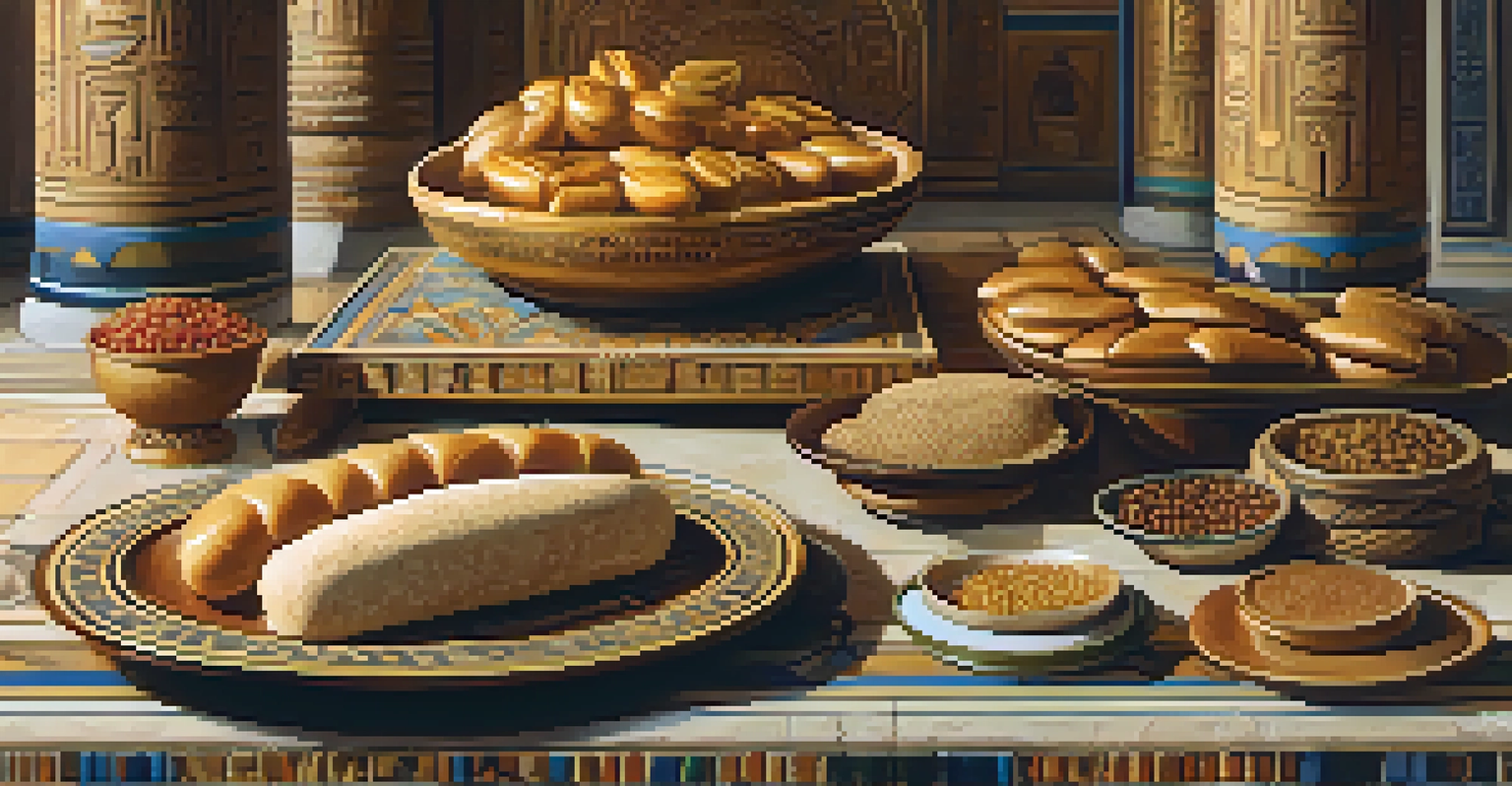The Spiritual Journey of Food in Ancient Egyptian Culture

The Role of Food in Ancient Egyptian Spirituality
In ancient Egypt, food was not merely sustenance; it was a vital part of spirituality. The Egyptians believed that meals nourished not only the body but also the soul. Rituals surrounding food often emphasized this connection, highlighting the idea that what one consumed could affect their afterlife.
Food is our common ground, a universal experience.
For example, offerings of bread and beer were common at temples, symbolizing the sustenance that gods provided. These offerings were thought to appease the deities and ensure favor both in this life and the next. Thus, food became a bridge between the physical and spiritual realms.
Furthermore, during significant ceremonies, the preparation and presentation of food were steeped in ritual. These practices transformed simple ingredients into sacred offerings, reinforcing the belief that every meal had a higher purpose.
Food Offerings to the Gods: A Sacred Tradition
Food offerings played a crucial role in ancient Egyptian religious practices. Families would often prepare special dishes to present to the gods, seeking blessings and protection. This act of giving was seen as a reciprocal relationship, where the divine provided in return for human offerings.

These offerings often included staple foods like bread, fruits, and meats, all prepared with care and reverence. Temples were adorned with vast amounts of food, left to nourish the deities, creating an atmosphere of abundance and gratitude. The act of offering was not merely ritualistic; it was a heartfelt gesture of devotion.
Food as a Spiritual Bridge
In ancient Egypt, food was viewed not just as sustenance but as a vital link between the physical and spiritual realms, influencing both life and afterlife.
Moreover, the concept of 'ma'at'—the balance of order, truth, and harmony—was central to these offerings. By providing food to the gods, Egyptians believed they were contributing to the cosmic balance that upheld the universe, intertwining their daily meals with divine significance.
The Journey of Food from Earth to Afterlife
The journey of food in ancient Egypt extended beyond the earthly realm; it was intricately linked to the afterlife. The deceased were often buried with food, reflecting the belief that one would need sustenance in the next world. This practice highlighted the importance of food as a means of survival beyond death.
Let food be thy medicine and medicine be thy food.
In tombs, you could find elaborate depictions of feasts, showcasing the types of food the deceased enjoyed in life. These images served as a reminder that food could transcend death, allowing for a continued relationship with the living. It illustrated the idea that the pleasures of the earthly life could be enjoyed in the afterlife.
Moreover, the ancient Egyptians believed that food in the afterlife would be provided by the gods. This belief instilled a sense of comfort, knowing that even in death, one would not go hungry, reinforcing the spiritual journey that food represented.
Symbolic Foods and Their Spiritual Meanings
Certain foods held specific symbolic meanings in ancient Egyptian culture. For instance, bread was not only a staple food but also represented life and sustenance. It was often used in rituals to symbolize the nourishment provided by the gods, reinforcing the connection between food and spirituality.
Similarly, the lotus flower, a common motif in art and cuisine, symbolized rebirth and regeneration. This flower was often included in offerings to the gods, emphasizing the cycle of life and death. Each food item was carefully chosen for its spiritual significance, making meals a profound expression of beliefs.
Sacred Food Offerings
Food offerings to the gods were a central aspect of ancient Egyptian spirituality, symbolizing devotion and the reciprocal relationship between humans and the divine.
Understanding these symbols adds depth to our appreciation of ancient Egyptian culture. It reminds us that what we eat can carry meaning, transforming a simple meal into a sacred act that honors the divine.
Festivals and Feasting: Celebrating with Food
Festivals in ancient Egypt were vibrant occasions filled with joy, music, and, of course, food. These celebrations often centered around agricultural cycles, honoring the gods who ensured a bountiful harvest. Food played a central role, symbolizing gratitude and community.
During these festivals, elaborate feasts showcased the abundance of the land. People gathered to share meals, strengthening bonds with family and the community. This collective sharing of food reinforced social ties and was seen as a way to honor the gods together.
Moreover, these feasting traditions offered a unique opportunity to reflect on the spiritual significance of food. Each dish served during the festivities was a reminder of the blessings received and a way to express thanks for the nourishment provided by the divine.
The Role of Agriculture in Spiritual Practices
Agriculture was the backbone of ancient Egyptian society, deeply intertwined with their spiritual beliefs. The annual flooding of the Nile was seen as a gift from the gods, bringing fertility to the land. This cycle of planting and harvesting was celebrated as a divine rhythm that sustained life.
Farmers would often pray and make offerings before sowing seeds, seeking the gods' favor for a successful harvest. This connection between agriculture and spirituality reinforced the idea that food was a divine provision, linking the earth to the heavens.
Agriculture's Spiritual Significance
Agriculture was deeply tied to spirituality in ancient Egypt, with the Nile's flooding seen as a divine gift that sustained life and reinforced the connection between earth and the heavens.
Thus, the act of farming was not just a means of survival; it was a spiritual practice. Every crop harvested was a testament to the gods' blessings, reminding the Egyptians of their reliance on divine forces for sustenance.
Culinary Arts as a Form of Spiritual Expression
The culinary arts in ancient Egypt were more than just a means to prepare food; they were a form of spiritual expression. Chefs and cooks held esteemed positions, as their skills were believed to be a gift from the gods. The preparation of food was often approached with reverence and care.
Recipes were passed down through generations, each dish carrying a piece of history and tradition. The meticulous preparation of meals was seen as an extension of worship, where each ingredient was chosen with intention, reflecting the values and beliefs of the culture.

This dedication to culinary arts illustrates how food was interwoven with identity and spirituality. The act of cooking transformed ingredients into a sacred experience, where each meal became an offering that celebrated both heritage and divinity.